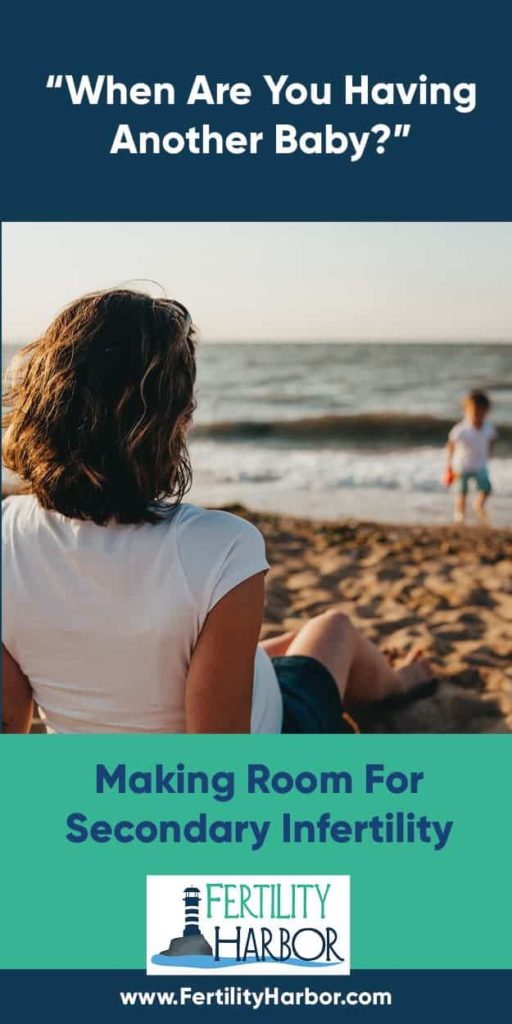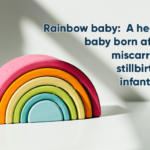This post was reviewed for medical accuracy by Rosalie Gunson, a Certified Registered Nurse Practitioner specializing in fertility care.
Secondary infertility affects people who were able to have at least one child without difficulty, but are now struggling to conceive again or carry another child to term.
While many of the potential treatment options for primary infertility can work for secondary infertility, those options may not be feasible in every situation. IVF, surrogacy, and adoption are complex, time-consuming, expensive processes that are not guaranteed to succeed.
To make matters worse, the infertility community is not especially welcoming to people struggling to have baby #2 — much less #3 or #4. That can magnify the feelings of guilt that so often accompany secondary infertility.
Even if you’ve decided to stop trying for another baby, it doesn’t mean you suddenly stopped wanting more children. It is normal to grieve for the family you envisioned having. It’s also common to feel a mix of emotions, including resentment, jealousy, anger, and shame. Counseling can be very helpful in processing these feelings and coming to a resolution.
This post is intended for those who have decided not to expand their family through (additional) fertility treatments or adoption. It is not at all meant to discourage anyone who still dreams of having another child!
What causes secondary infertility?
There are many causes of secondary infertility, but here are a few examples:
MOTHER’S SIDE:
- Age (late 30’s +) or premature ovarian failure
- Complications from a past pregnancy or delivery
- Scar tissue from past endometriosis or abdominal surgery
- Development of a new health condition that affects fertility, such as thyroid disease
- An existing fertility issue that you didn’t know about (just got lucky before)
FATHER’S SIDE:
- Development of a health condition that lowers sperm count or quality
- An existing fertility issue that you didn’t know about (just got lucky before)
Unfortunately, it’s not always possible to pinpoint the cause. People with unexplained secondary infertility are left asking, “What changed? Why is getting pregnant (or staying pregnant) so much harder now?” Even a reproductive endocrinologist may not be able to provide a satisfactory answer.
Infertility testing and treatment can be exhausting in every possible way. It’s no surprise that many people decide enough is enough — they’re open to a spontaneous pregnancy, but they’re not going to do more fertility treatments. See TTC Naturally After Failed IVF for more on that approach.
In some cases, fertility treatment wouldn’t even solve the problem. For example, many mamas who had serious pregnancy complications decide not to have another child, even if they’re not likely to experience the same complication again.
Miscarriage scares, emergency deliveries, and NICU stays can have long-lasting psychological impacts, including post-traumatic stress.
Common struggles with secondary infertility
Maybe you never thought you’d want another child, but here you are with raging baby fever. Or maybe you always dreamed of a larger family, but ran into fertility challenges you didn’t foresee. Either way, secondary infertility wasn’t part of the plan. It never is.
As I’m sure you’ve noticed, there’s a widespread assumption that everyone wants, and can have, exactly two children. That viewpoint can be very hurtful to anyone with secondary infertility (and anyone who simply wants 0, 1, or 3+ children!).
Our only children are twins, and I can’t tell you how many strangers have congratulated me on being “one and done.” I got two children from one pregnancy, so obviously my family must be complete. For all they know, I’d been desperately trying to have a third baby!
On the other hand, no one expects us to announce another pregnancy. All my mama friends with singletons are continually asked when they’re giving their child a sibling. Some people even make snotty little comments about only children being spoiled and lonely.
If you have secondary infertility, you’re probably all too familiar with these types of comments. Here are some other challenges and triggers that may be relatable:
- Trouble getting doctors to take your fertility concerns seriously because you’ve already had a baby
- Guilt that your family doesn’t feel complete when you know others are struggling to have their first baby
- Anxiety about the other aspects of your life that are on hold while you’re TTC
- Dismay at the thought of your child growing up without siblings, especially if you are very close to your own sibling(s)
- Pressure from parents or in-laws to give them more grandchildren
- Difficulty giving away baby clothes or toys
- Shame at feeling jealous of your friends’ ability to get pregnant easily (as far as you know…)
- Nostalgia for all things baby, especially if you enjoyed pregnancy or the newborn phase, and sadness that you might not get to experience it again
- Conflict with your partner over whether to continue trying for another baby, even if you initially agreed on how many children you wanted to have
- Frustration at the suggestion that you “just adopt” another baby
This list actually makes me cringe because I’ve been That Person in the past. I know better now!
The “Why don’t you just adopt?” question
This one deserves a little more elaboration because it’s so ridiculous.
First of all, adoption is nowhere near as easy as many people blithely assume. It’s incredibly stressful, time-consuming, and expensive. Domestic infant adoption can cost more than a brand-new car!
It’s also not guaranteed to work out. You could finally get matched with a birth mother, eagerly follow her pregnancy, and get the nursery all decorated — only to have her change her mind at the last minute and keep the baby. All you’d get in that scenario is heartbreak.
Also, not everyone feels called to adopt, and that’s OK. Adopting a child is a permanent, life-changing decision for everyone involved. Treating adoption as a last resort is unfair to the hypothetical child being adopted, and it undervalues the commitment that adoptive families make.
In fact, many adoption counselors advise people not to pursue infertility treatment and adoption at the same time, to prevent their hearts being pulled in different directions.
Reminder: You do not need to justify your reproductive dreams and decisions to anyone.
Strategies for accepting that your family is complete without more kids
- Try re-framing the situation to take back some control. For example, focus on the decision not to pursue (additional) fertility treatment.
- Embrace the routine you’ve established. Once your youngest child is relatively self-sufficient and established in school, starting all over again with a newborn can be daunting. Another child may also disrupt your long-term career plans.
- Look for other outlets for your nurturing instincts. Coaching a sport or volunteering at your child’s school are some obvious examples, but caring for animals can also help.
If your child will be an only child
- Look for other ways for your child to interact with other kids. Playdates, teams, camps, clubs, church groups, and visits with any other kids in the family (such as cousins) are all wonderful opportunities for social development.
- Embrace the fact that you can focus your time and resources on one child. Child care, extracurricular activities, summer camps, and tuition for college or private school will be easier to afford. You won’t need a bigger car or a bigger house. Taking one child on vacation is much easier than taking a whole crew!
- Remember that motherhood comes with a lot of second-guessing no matter what. While you worry that your child will be lonely without siblings, other mamas are trying to get their kids to stop fighting!
Making Room For All Types of Infertility
Those experiencing secondary infertility — who by definition already have at least one child — can feel left out and unwelcome in the infertility world, because so much of the energy is focused on people trying to have their first baby. That’s horribly unfair.
As my friend put it, “Those in this ‘secondary’ experience are mostly silent and unacknowledged. It makes it worse, since support helps so many people get through (pregnancy AND parenthood).”
Negative pregnancy tests, unsuccessful fertility treatments, and miscarriages can be devastating whether someone already has a child or not. Telling women with secondary infertility that they should just be grateful for the child(ren) they have is not a helpful or empathetic response.
So what can we do about it?
We can stop assuming that everyone can have the number of children they want, and that that number is two.
Before making a comment about these topics, we can remember that for all we know, the person we’re talking to is struggling to get pregnant or just lost a pregnancy. If that “joke” suddenly feels cruel instead of funny, we can choose to say something more considerate instead.
As women, we can stop turning our struggles into bragging rights. A mother’s love is not measured by the number of IVF rounds she did, pregnancies she lost, or hours she spent in labor. Our energy is better spent lifting one another up, not competing in some perverse gauntlet of suffering.
Above all, be kind.
“There’s only one rule that I know of, babies—God damn it, you’ve got to be kind.”
– Kurt Vonnegut

This post was last updated in June 2020.



 I’m Jenn! Here I am with my beautiful twin boys. My pregnancy was possible thanks to fertility treatment for PCOS.
I’m Jenn! Here I am with my beautiful twin boys. My pregnancy was possible thanks to fertility treatment for PCOS.


